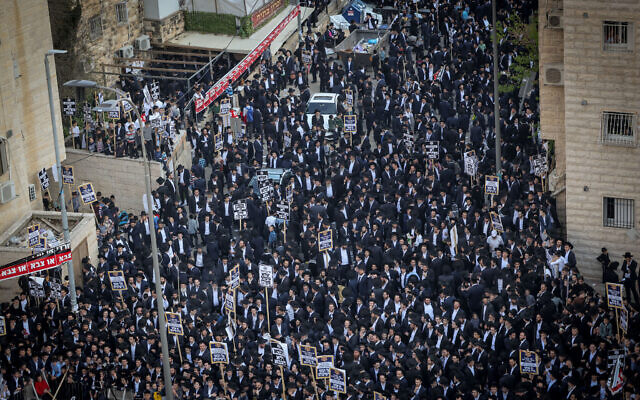



Defense Minister Yoav Gallant was presented on Tuesday with a lengthy report laying out how the country could effectively recruit and integrate members of the ultra-Orthodox community into the Israel Defense Forces.
The 49-page document (Hebrew) was written by a team led by former commander of the Israeli Air Force, Maj. Gen. (res.) Eliezer Shkedi, at Gallant’s request.
The team was established in December, following “the identification of the willingness of members of ultra-Orthodox society to serve in the IDF following the events of October 7,” the Defense Ministry said in a statement.
The report aims to provide a “practical and applicable” solution to the issue of ultra-Orthodox conscription, regardless of ongoing attempts by the government to legislate a new draft law.
Among the recommendations written in the report were establishing a new basic training base for Haredi recruits; building new tools to better classify Haredi draftees so that they can be allowed to serve in any part of the military according to “their skills and wishes,” rather than limiting them to a handful of roles; providing financial aid to young Haredi men who do not get support from their families; identifying Haredi men who are above the age of deferment but have unique skills needed by the army; removing the status of deserter from Haredim who wish to return and serve, or those who were released from service under false pretenses; and building a program to enable ultra-Orthodox men to integrate into the workforce after their military service.
The ministry said Shkedi’s team worked for months on the report, during which they met with “senior rabbis and leaders of the various sects in the ultra-Orthodox community” as well as IDF commanders and Haredi men who expressed willingness to serve.
Shkedi, in a call with reporters, said the team had recommended that the report be implemented by the end of the year, while noting that some of the recommendations have already begun to be implemented on a trial basis.
The former Air Force chief stressed the “acute” need to conscript ultra-Orthodox Israelis, particularly since October 7. “The importance of the issue… to the State of Israel and the Jewish people cannot be overstated,” he said.
Shkedi said that drafting Haredi men would be a “great privilege,” but that it must be carried out in an “understanding, accommodating, accepting” manner.
Haredi women and male yeshiva students are generally exempt from military service due to controversial longstanding arrangements.
In 2017, the High Court of Justice invalidated the legal exemption and ordered the government to pass a new conscription law. The government has since been unable to agree on legislation, repeatedly extending the non-conscription policy, while Haredi politicians have sought to pass legislation cementing the exemptions.
Many Haredim believe that studying the Torah helps protect the Jewish people and even the state, and that serving time in the army would dilute adherence to their strict ways of life and lead impressionable members of the community astray.
Among non-Haredi Jews, this is widely perceived as draft-dodging by a group that refuses to integrate into mainstream society.
Many of those who do draft into the military and are counted in statistics as Haredi recruits have actually left the ultra-Orthodox world or are from the less stringent streams.
The Hamas attack and subsequent war with its massive mobilization of reservists has led commentators to note that a new law exempting members of Haredi society seems increasingly unlikely. The IDF is also seeking to increase the amount of time conscripts and reservists serve, as it prepares for a long war in Gaza.
Receiving the report, Gallant said it carried “good news for the entire nation of Israel and members of the ultra-Orthodox community in particular” because it envisions them being able to enlist in the IDF while preserving their traditional way of life.
“As the IDF is fighting on seven fronts, near and far, to maintain Israel’s security… we must make sure that everyone who is needed can join,” he said.
Gallant said the defense establishment, and IDF, would study the report and its recommendations and would “formulate within a short time a comprehensive work plan to implement the conclusions.”
IDF Chief of Staff Lt. Gen. Herzi Halevi and the ministry’s director general, Eyal Zamir, were also presented with the report on Tuesday.
The law allowing for blanket military service exemptions expired in June 2023, and a subsequent government resolution instructing the IDF not to enforce conscription on such men despite the expiry lapsed on April 1.
The High Court issued an interim order on March 28 that state funding for Haredi yeshivas for students obligated to enlist must be frozen, and that there was no longer any legal framework to not draft eligible Haredi men to the IDF.
This presented a massive political problem for Prime Minister Benjamin Netanyahu and his coalition, since he does not have a majority without the ultra-Orthodox parties, for whom the blanket exemptions from military service and yeshiva funding are critical priorities.
The High Court is scheduled to hear arguments over petitions demanding the immediate enlistment of Haredi yeshiva students on June 2. Although the government was to have presented the court with its legislative plans for increasing ultra-Orthodox enlistment by May 1, the court gave it an extension after the government failed to come up with concrete proposals.
Times of Israel staff contributed to this report.



